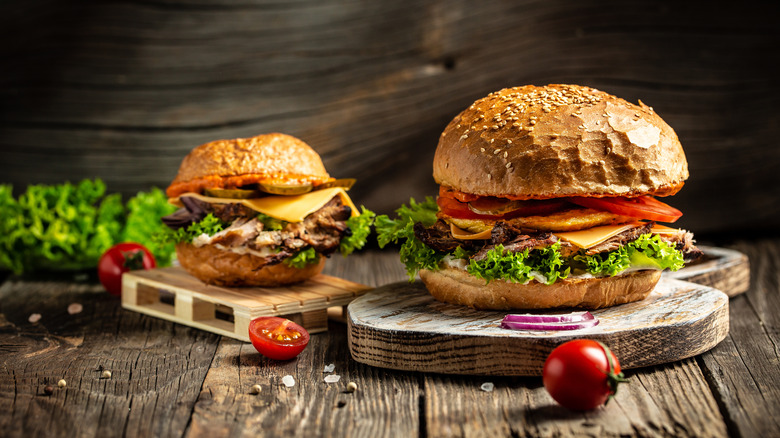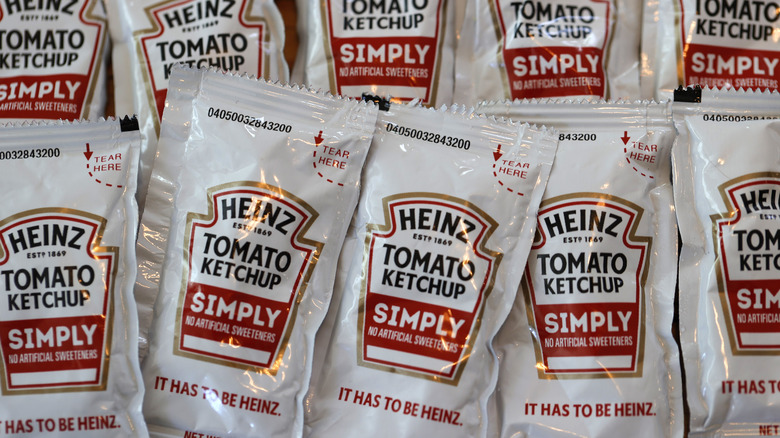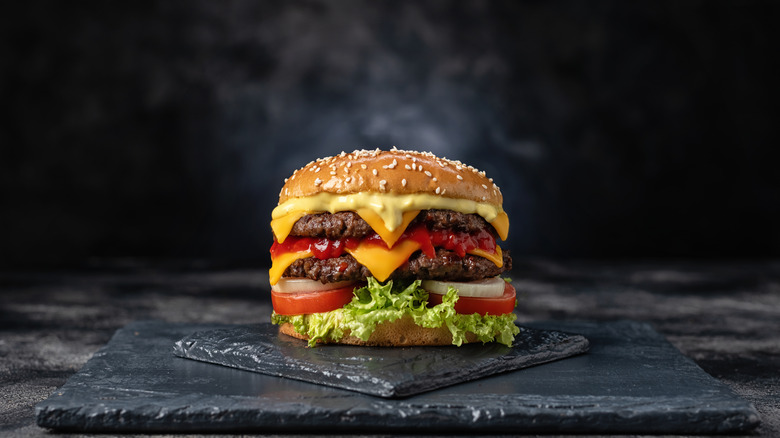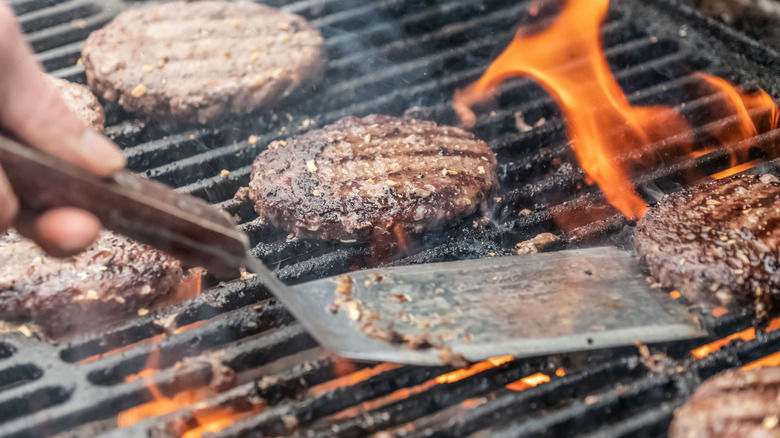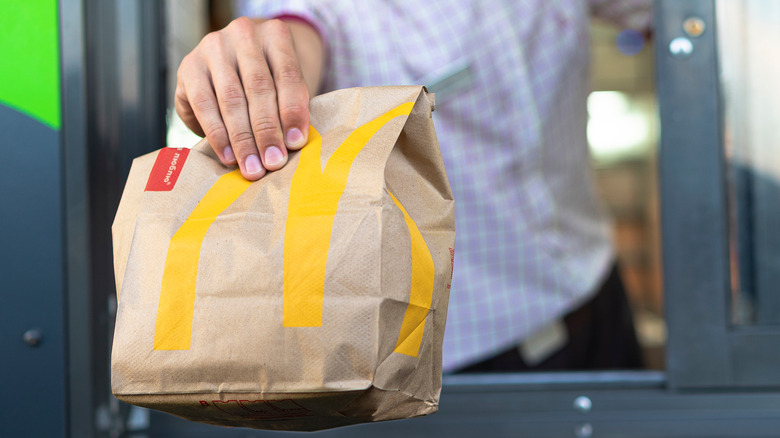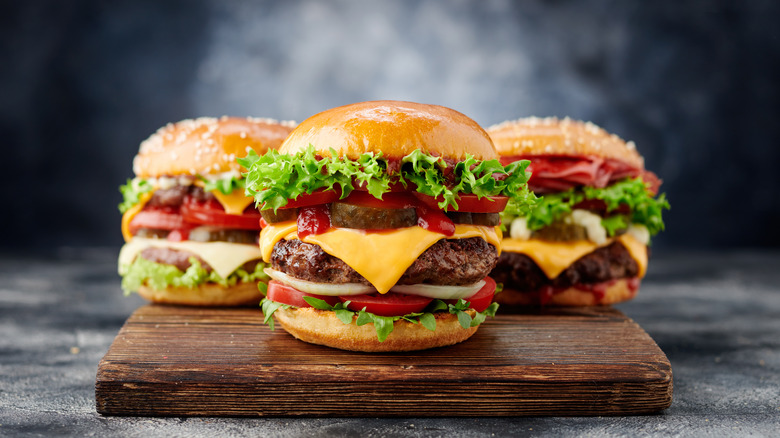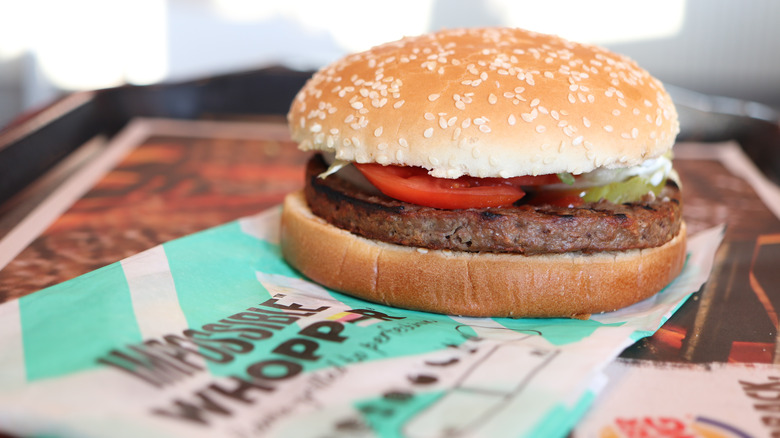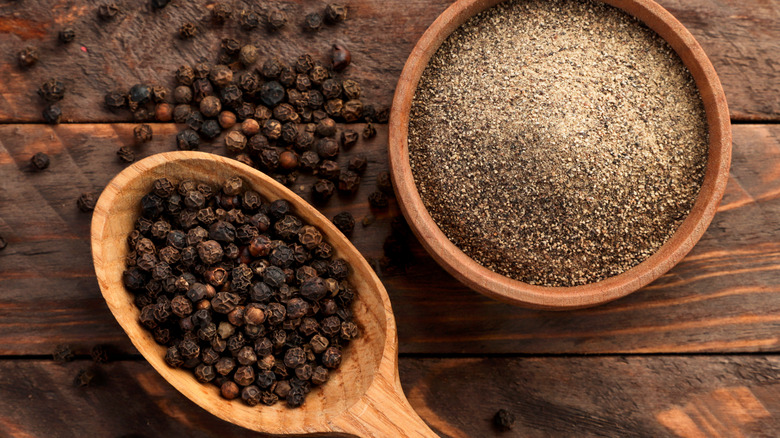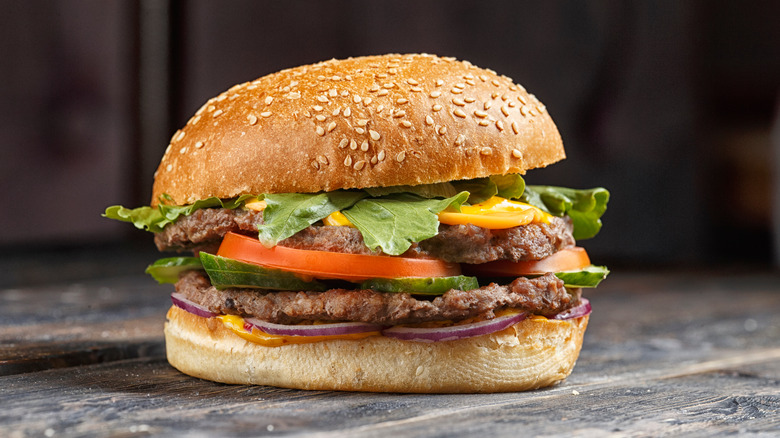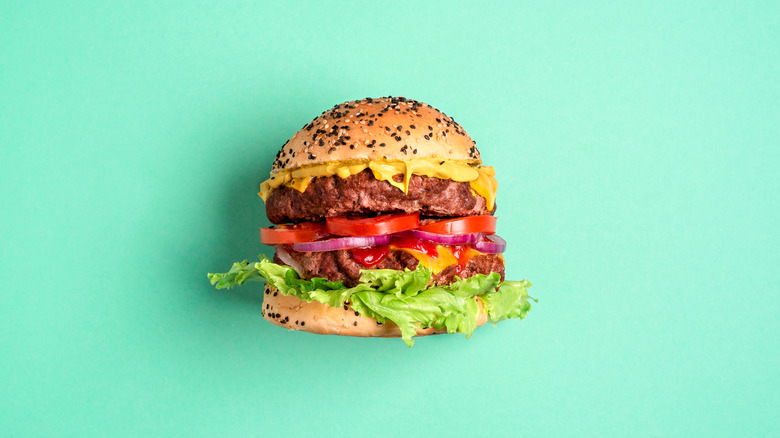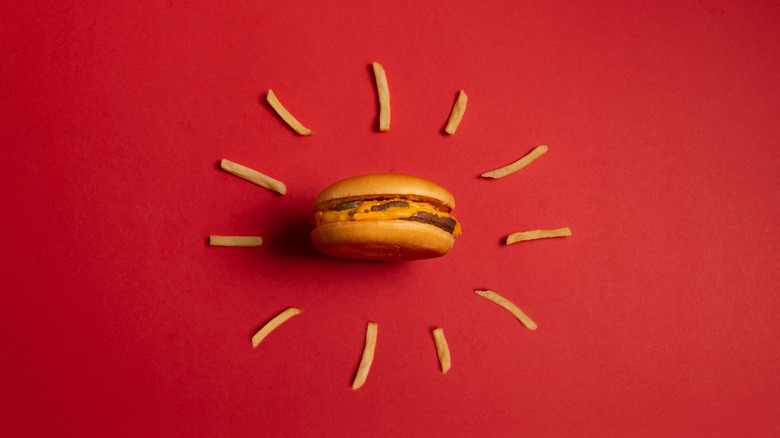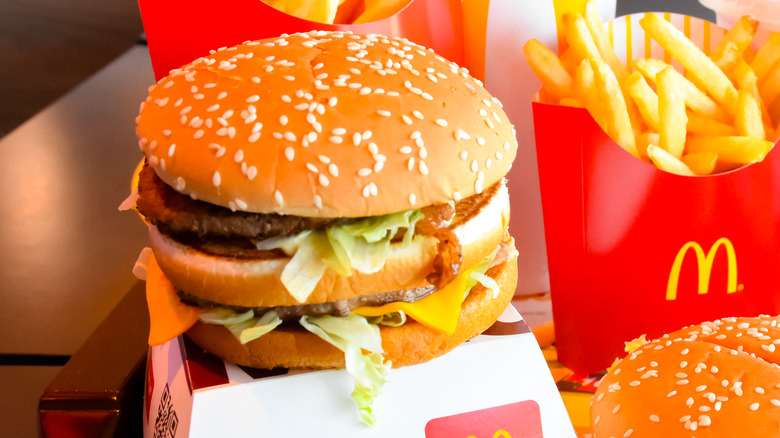False Facts About Burgers Everyone Believes
Burgers are some of the most well-loved sandwiches to ever grace our meat-preoccupied planet. And we can't lie, a juicy burger patty topped high with tomatoes, onions, lettuce, and a smattering of sauces sounds great pretty much any day of the week. But whether you only have a burger a few times a year or it's a food you crush on the weekly, there's a good chance that you've totally bought into some of the most common false facts about burgers.
Some of these myths pertain to your favorite fast food burger, and some postulate on the best way to cook a burger at home. But what these facts all have in common is the fact that they're false, fake news, just completely untrue. We don't blame you for believing them — we did too. But upon some digging, we discovered that many of the facts we hold to be self-evident about burgers are anything but.
That's why we've created this list of some of the most common false burger facts you may be spewing to your culinary disciples. Get your facts straight so you can start enjoying better burgers. Isn't that what it's all about?
Grilling is the best way to achieve burger perfection
It's a hot summer day, you have friends over, and you want to make sure everyone's fed. You're not going to turn on the oven and heat up the whole house to make a roast, that's for sure. So your best option? Fire up the charcoal grill and put some burgers on! It seems like a no-brainer, but we were wondering: Is grilling actually the best option?
Well, people who live in apartments without access to a grill can rejoice, because it turns out that grilling isn't the only way to cook a delicious burger. In fact, it may not even be the best way. Think about it: The best part of a burger is its juiciness. Who wants to gnaw on a puck of dried-out meat between two slices of bread? But when you use a charcoal grill to cook your burgers, a lot of that delicious fat and flavor drips down onto the coals.
However, when you use a flat top grill or a skillet, you're not going to lose that juiciness, per Schweid and Sons. On a flat surface, the burger "cooks evenly thanks to a very precise and even cooking plane." Moral of the story? No need to fire up the grill every time you want to cook a burger. An indoor skillet or griddle will work just as well (and is probably a lot easier).
Ketchup was always a burger staple
For some people out there, ketchup seems like a no-brainer addition to any good burger. What would this staple sandwich be without a drizzle of the sweetest, most tomato-y condiment around? While we may not be fans of ketchup on burgers (or ketchup on anything, really), we don't judge those who need a dose of the sweet stuff to make their burgers go down easier. However, you should know that ketchup wasn't always a staple on burgers.
First We Feast gives us the real story: When hamburgers were first being served in the U.S. in the 1920s, they didn't have ketchup on them at all. But then, big, corporate burger spots started popping up all over the country, and they needed to increase their profits. How were they going to convince kids to eat their food? As it turns out, adding a sweet sauce to an already indulgent meal wins the little ones over. Thus, the ketchup-hamburger partnership was established.
Of course, just because ketchup wasn't a feature in the hamburgers made way back when doesn't mean you can't enjoy it now. But it also means that all the ketchup lovers out there should give the rest of us ketchup-detesters a break — we're just doing things the traditional way.
Hamburgers hail from Hamburg, Germany
The U.S. has a short history, so it makes sense that most of its culinary traditions hail from places outside its borders. The food culture in this country has generations of immigrants to thank for its most delicious dishes. So, it just makes sense to assume that hamburgers, American though they may seem, truly hail from Germany — Hamburg, Germany, to be specific. And while German foods were a clear influence in the creation of the hamburger we know and love today, it turns out that burgers really are a U.S. invention, according to Mel Magazine.
The dish frikadelle is basically a "flattened beef meatball" that's filled with egg, onions, and breadcrumbs, so it definitely resembles a burger. And the Germans also had rundstück warm, a type of meat sandwich. The exact origins of the American hamburger aren't known (Texas, Connecticut, Oklahoma, Wisconsin, and New York all claim to have birthed the sandwich), but it's clear that the burger got its start within American borders sometime in the late 19th century.
So while, yes, the invention of the burger was influenced by European forces, burgers really are as American as ... apple pie?
You should only flip a burger once
Cooking meat can be tricky — there are all sorts of rules you need to keep in mind if you want to make sure your meat comes out tasting delicious and also, more importantly, doesn't give you or your guests food poisoning. One of those rules for many types of meat is the only-flip-once rule. And in some cases, like with pork chops, this is solid advice. But when it comes to burgers? It's just not true.
According to First We Feast, there's a rumor going around burger-cooking circles that flipping your burger more than once will cause it to dry out. Actually, they warned that cooking your burger in this fashion could result in an overcooked exterior and undercooked inside. Clearly, that's not ideal. Instead, you should flip your burger every 30 seconds or so to ensure that it cooks as evenly as possible.
Sure, this requires a little more work at the grill or the griddle, but it'll all be worth it when you taste your burgers in the end. Plus, it gives you a little more latitude to check on your burgers as they cook. Don't be afraid to flip!
"Flipping burgers" is an easy job
One false fact about burgers isn't about the burgers themselves but rather about the people who are making the majority of our burgers on a daily basis. They're fast food workers often derided as "burger flippers," and their professions are often categorized as easy jobs for slackers. Work one day in a fast food restaurant, though, and you'll realize that this idea couldn't be any further from the truth.
Vox claims that some "low-wage jobs have become some of the hardest in America," and fast food jobs are a perfect example of that phenomenon. The hours are typically long and hard and provide very few breaks. One fast food worker said, "Fast food is intense! And it's stressful! You're always feeling rushed, you're on a time crunch for literally eight hours straight, you're never allowed to have one moment just to chill." These workers are often overly-monitored by supervisors, and they also have to deal with disrespectful customers on a regular basis. Additionally, fast food workers often have precarious schedules that don't allow them to plan more than a week or so in advance.
And when you consider that most fast food workers make low wages (some way, way too low to even meet the basic cost of living), it's clear that "burger flippers" are some of the hardest-working and least-appreciated cogs in the economic machine. These essential workers deserve our utmost patience and respect, to say nothing of livable wages.
Burgers are always bad for you
If there's one food that stands as a symbol of unhealthy food, it has to be the humble burger. It makes sense, considering that burgers are seemingly ubiquitous at fast food joints, which generally serve notoriously unhealthy food. We're certainly not going to argue that eating a Big Mac every day is a decision that works in the interest of your health, but fast food burgers and homemade burgers made with fresh, whole food ingredients are totally different and should be treated as such by those who are watching what they eat.
According to Men's Journal, lean ground beef is a great way to get a dose of protein in your diet. Sure, you may not want to eat red meat every day, but it's not as terrible for you as you might assume. The real problem comes in when you start topping your burger with mayo, aioli, fried eggs, bacon, or other super-fatty additions. Instead, if you're trying to build a healthier burger, consider adding plenty of fresh veggies and condiments like mustard and hot sauce instead. That way, you get that amazing burger flavor you love without feeling like you just took a year off your life.
Plant-based "meats" are your healthiest burger option
Some of us are concerned about eating too much red meat. Whether you want to reduce your beef intake for the sake of your health or for the environment, it's definitely not a bad move. However, thinking that replacing your normal beef burger with a plant-based meat alternative will catapult you to the best health of your life isn't a belief that aligns with reality.
Here's the thing: Plant-based meats are often really, really high in sodium, per WebMD. While making the switch from meat to "meat" can have some health benefits for some diners, it's not an ideal solution for everyone. If you have high blood pressure, for example, the excess salt content in many of your favorite plant-based meats could cause more problems than they're worth.
If you're looking for the healthiest burger option, you're probably best off making your own plant-based burger from scratch. This means including ingredients like beans and mushrooms to get the kind of consistency you're looking for. Of course, we all deserve a treat sometimes, and if you're truly craving a meat-free substitute, go for it! Just don't assume you're eating the equivalent of a raw salad.
You should use salt and pepper on your burger before you cook it
Spend a lot of time in the kitchen? Then you probably know how important it is to season your food, especially meat, before you cook it. The difference between a well-seasoned hunk of meat and a plain one can be huge in terms of flavor and even juiciness. However, that doesn't mean you need to pack on absolutely all of the seasonings before you cook your burger. As far as adding salt to your burger? That's a solid idea, per Men's Journal.
But salt's partner in crime, pepper? Keep that stuff far away from your burger before you place it on the grill or griddle. It's a false fact that adding pepper to your burger before cooking it will enhance the flavor. According to Men's Journal, pepper can get bitter once it's been cooked. The last thing you want to do is bite into a bitter peppercorn, so make sure you don't add any to your burgers until they're ready to serve.
Bigger is always better
Back in the day, it may have been fashionable to craft a big, thick burger that's hard to wrap your mouth around. Sure, a massive burger may have some benefits, but we're here to tell you that it's just not true that this is the best way to make a burger. First of all, larger burger patties are more difficult to eat, which can make for a frustrating dining experience. And second of all, sometimes those massive patties just have way, way too much meat in them to truly enjoy in one sitting.
Plus, there's a rise in restaurants smashing their burgers, making them super thin so they're not just easier to eat but also so they're nice and crispy. We happen to be fans of this kind of burger, and it's no wonder why: According to Wonder How To, it all comes down to the Maillard reaction, which is why browned food tastes so good. When you smash a burger on the griddle, more surface area reaches the heat, creating more of that browning. So while you may have been taught to never, ever smash your burger for fear of releasing those precious juices, we have to bust this burger-making myth — in your best interest, of course.
Eating a burger right-side up is the best way to do it
You may not even realize that you take this belief as fact: It's always better to eat a burger right-side up, with the fluffier bun on top. Of course, this may be the traditional way of doing things, but we don't think you should always cave to tradition, especially when it just doesn't make that much sense. And as CNet explains, eating your burger upside-down is probably the better way of doing things.
Why? Because the bottom of the bun is usually thin — so thin that it can't handle the weight of all that meat along with those juices and all the condiments. Therefore, it often crumbles, leaving you with a mess of a burger that has to be eaten with a fork. Turn your burger upside-down, they say, and you won't experience this problem.
Look, we know it's not for everyone. Maybe you don't want to try it out for the first time when you're dining with people you don't know very well. But you have to admit, it's a solid solution to an eternal problem.
McDonald's burgers never rot
Here's one nugget of information you may have taken as fact for quite some time: The burgers at McDonald's never rot. You could keep a McDonald's burger on your counter, intact, for years, and nothing would happen to it. No mold would grow. You'd be able to eat it after all that time, and the taste wouldn't change. First of all, don't do this. It's gross. But even if you did, you'd soon realize that this "fact" couldn't be further from the truth.
Serious Eats decided to bust this myth for themselves, and their results are conclusive: McDonald's burgers do rot if you leave them out for long enough. It's simply not true that they're so packed with preservatives that they could survive another Ice Age intact. We're not saying that McDonald's burgers are the best burgers out there or that they're even a reasonably healthy option, but at the very least, you shouldn't worry that they're literally immune from decomposition.
McDonald's burgers are made with worm as filler
People love to hate on McDonald's burgers, and though some of that hate could be justified, these rumors have got to go. You might believe that McDonald's burgers are made with worms used as filler. Ew. But you should be glad to know that this "fact" is indeed false. Business Insider reports that back in 2016, some dubious "news" sources claimed that the CDC was investigating whether McD's burgers contained parasitic round worms.
But it didn't take long to come to the conclusion that the rumors just weren't true. In fact, Business Insider even claims that this rumor doesn't even make sense because adding worms to burgers would be even more expensive than just using ground beef. We get it — fast food isn't to everyone's liking, and some can find it unappealing. But just because it's packed with too much fat and salt doesn't mean that health violations of this magnitude are going on behind the scenes.
